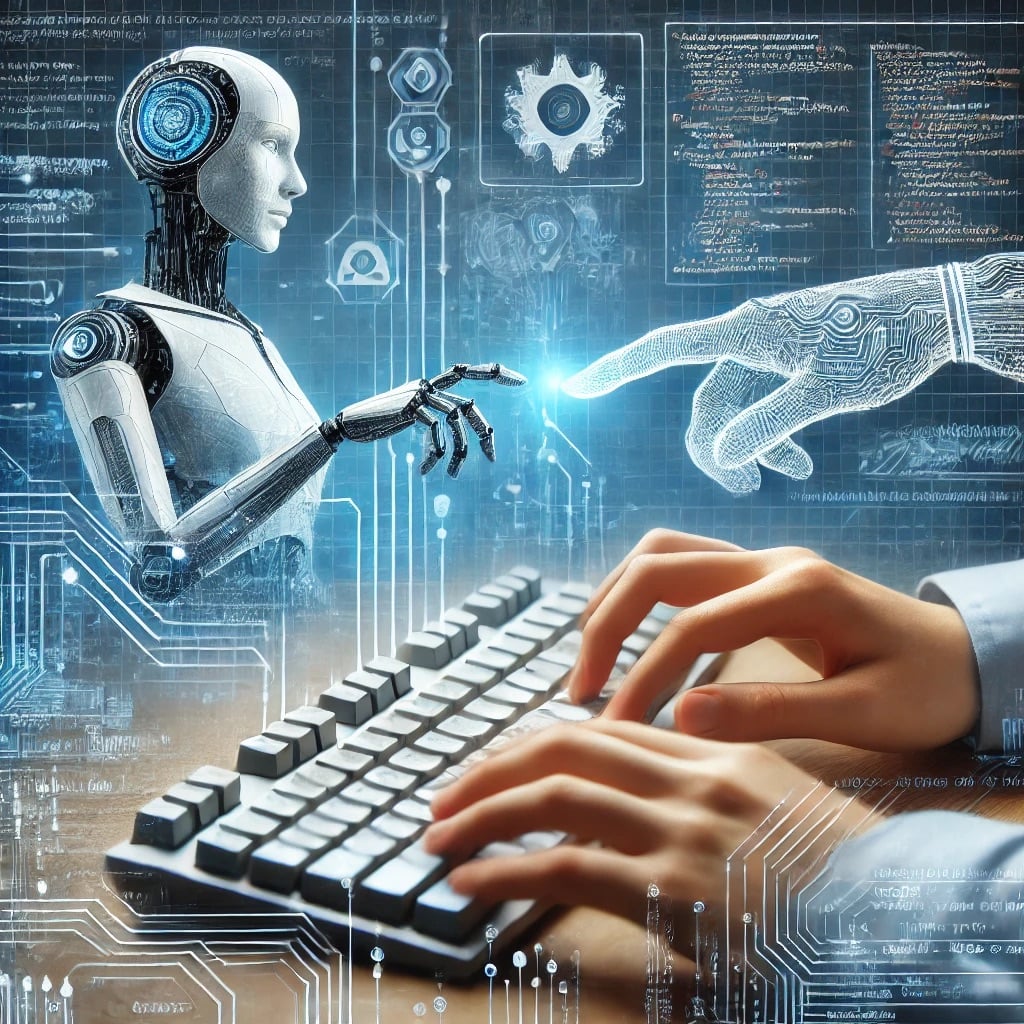The Future of AI in Programming: How AI is Revolutionizing Software Development
Artificial Intelligence (AI) is rapidly transforming how we write, test, and maintain software. AI tools are reshaping the future of programming by automating mundane tasks, improving code quality, and empowering developers to work more efficiently. In this blog post, we’ll explore the key ways AI is impacting programming, current trends, and what we can expect by 2025.
1. AI-Powered Code Generation
AI tools like GitHub Copilot, based on OpenAI’s GPT models, have introduced significant advances in code generation. These tools can suggest code snippets, complete entire functions, and even generate boilerplate code based on comments or initial inputs from developers. This reduces the need for manual coding, allowing developers to focus on more creative and high-level problem-solving tasks.
Copilot’s ability to understand natural language instructions and turn them into functional code marks a shift towards more intuitive development processes. Other platforms, such as Tabnine, also assist with autocompleting code using AI-based suggestions tailored to your specific development environment.
By 2025, AI-driven code generation will likely become more advanced, capable of handling increasingly complex tasks, potentially automating large sections of programming projects.
2. AI-Driven Bug Detection and Debugging
Finding and fixing bugs is one of the most time-consuming parts of software development. AI is making this process more efficient by using machine learning to detect code patterns that are prone to bugs. Tools like DeepCode analyze vast repositories of open-source code to identify common coding errors, security vulnerabilities, and performance issues, helping developers fix problems before they impact users.
With AI-driven bug detection, developers can receive real-time feedback on potential issues, including suggestions for how to fix them, leading to faster and more secure software releases.
3. Automated Testing and Quality Assurance
AI is also revolutionizing software testing. Tools like Testim.io use machine learning to create automated tests that adapt to code changes, reducing the manual effort required to maintain test suites. These AI-based testing tools learn from previous test cases and provide intelligent recommendations for new test cases, improving overall software quality.
By 2025, AI-driven testing tools will become even more sophisticated, helping to automate the entire testing lifecycle from unit testing to regression and performance testing, making continuous integration and delivery more seamless.
4. Low-Code and No-Code Development Platforms
AI-powered low-code and no-code platforms like OutSystems and Bubble are gaining popularity, enabling non-developers to build applications with minimal coding knowledge. These platforms leverage AI to automate backend and frontend code generation, simplifying application development for users while freeing up developers to focus on more complex and critical tasks.
As these platforms evolve, expect to see more businesses and individuals building functional applications without deep technical knowledge, thanks to the underlying AI technology guiding the process.
5. Enhanced Documentation with AI
AI is also helping developers create better documentation. Tools like Mintlify automatically generate readable, structured documentation based on the codebase. This can significantly reduce the time developers spend on writing and maintaining documentation, while also ensuring that documentation is always up-to-date with the latest code changes.
This trend will likely continue to grow, with AI providing more context-aware, real-time documentation updates, reducing knowledge gaps, and enhancing collaboration among development teams.
6. AI in Large-Scale Data Analysis and Optimization
Platforms like Databricks and Scale AI provide businesses with AI-powered tools to analyze massive datasets, optimize code, and train AI models. Databricks uses natural language interfaces to help developers and data scientists query data more easily, while Scale AI helps curate, label, and process large datasets for AI model training.
These platforms are laying the groundwork for a future where AI will not only assist in building software but also in making intelligent, data-driven decisions that impact everything from performance optimizations to business strategies.
7. AI-Assisted Security and Compliance
Security is becoming more crucial with the rise of AI-powered tools. AI platforms like Abnormal Security use advanced machine learning algorithms to monitor, detect, and prevent cyber threats in real-time. This automated security response helps protect codebases and applications from emerging security vulnerabilities, ensuring compliance with industry standards.
By 2025, we expect AI to play an even greater role in safeguarding software development processes, from preventing data breaches to ensuring regulatory compliance through intelligent monitoring.
What’s Next for AI in Programming?
The integration of AI into programming is accelerating, and we can expect even more groundbreaking developments by 2025. AI will not only automate routine tasks but also become a key partner in complex decision-making, problem-solving, and innovation in software development. Here’s what to look out for:
- Quantum AI: Leveraging quantum computing to solve problems that are currently beyond classical computing’s capabilities.
- AI-enhanced DevOps: End-to-end automation in the DevOps pipeline, from development to deployment.
- Advanced AI-driven personalization: AI models that adapt and optimize software for individual users or specific environments in real-time.
AI is set to redefine the future of software engineering, making it faster, more efficient, and more accessible to a broader audience. The collaboration between humans and AI will unlock new possibilities in the world of programming, with creativity and productivity reaching unprecedented levels.
Final Thoughts
The future of programming lies in the seamless integration of AI into every aspect of the development lifecycle. As tools continue to evolve and new AI-driven innovations emerge, developers can expect to spend less time on mundane tasks and more time focusing on solving the bigger challenges that shape the digital world.
AI in programming is just getting started, and the possibilities for 2025 and beyond are limitless.
Tags: AI programming, AI code generation, AI bug detection, AI automated testing, AI low-code platforms, AI development trends, programming future, AI 2025.
